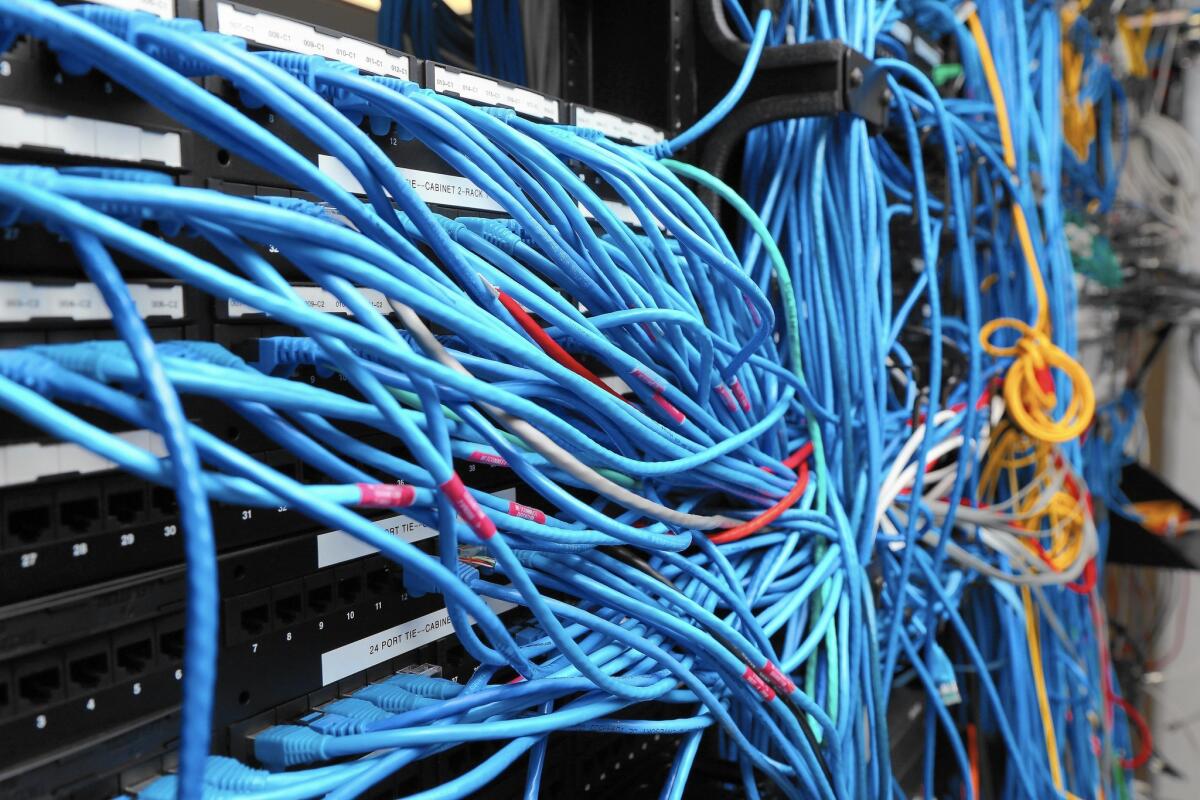FCC seeks broadband speeds with wow factor; telecom firms say, ‘Whoa’

Broadband Internet in this country just got a whole lot faster.
Actually the definition of broadband Internet just got faster — and the cable and phone industries are none too pleased about it.
The Federal Communications Commission voted Thursday to change the standard for U.S. broadband to a download speed of 25 megabits a second, more than six times zippier than the old standard of 4 megabits.
FCC Chairman Tom Wheeler, in calling for the change this month, said raising America’s broadband bar is “table stakes” for playing in a 21st century global digital economy.
The U.S. currently ranks 14th worldwide for broadband speed, according to the networking company Akamai Technologies. The average speed here is 11.4 megs a second.
South Korea is way out in front, with an average broadband speed of 24.6 megs a second. The rest of the top 10: Hong Kong, Switzerland, Japan, the Netherlands, Sweden, Latvia, Ireland, the Czech Republic and Romania.
Yeah, Romania.
The previous U.S. broadband standard of 4 megabits a second wasn’t exactly lightning-fast when you consider that some South Korean Internet users are on the verge of receiving a speed of 10 gigabits a second, or enough digital muscle to download a high-definition movie in seven seconds.
With a 4-meg connection, U.S. Internet users would have to wait hours to download the same film.
You’d think the American telecom industry would be cool with meeting higher broadband expectations. We invented the Internet, after all. The rest of the world should be eating our digital dust.
But guess what? The cable and phone industries think a faster broadband standard is unnecessary and impractical.
We just don’t need that much speed, they argue.
The National Cable & Telecommunications Assn. filed an opinion with the FCC last week declaring that the calls for a 25-megabit standard “dramatically exaggerate the amount of bandwidth needed by the typical broadband user.”
“Some are suggesting that NCTA is against this definitional change because the cable industry doesn’t want to deliver consumers faster speeds or improved infrastructure,” the group said in a related blog post. “This is laughable.”
Telecom companies are already offering speeds well above 25 megs a second, it said. AT&T and Verizon Communications made similar arguments in their own recent FCC filings.
So what’s the problem?
It’s this: Federal law requires that the FCC make sure broadband is being deployed nationwide in a reasonable and timely fashion. If the definition of broadband is changed, many current — read: slower — services would no longer qualify.
That would empower the FCC to exert pressure on telecom companies to step up their game.
And these guys would rather spend millions of dollars lobbying regulators and lawmakers than spending money to keep pace with the rest of the developed world in meeting demand for faster broadband.
Thursday’s FCC vote was 3 to 2, with the panel’s two conservative commissioners siding with telecom companies.
Republican Commissioner Ajit Pai said that 70 million households could buy faster Internet speeds if they wanted, but “choose not to.”
Berin Szoka, president of TechFreedom, a libertarian-leaning think tank, said the FCC’s action represented “a new low in cynical, elitist politics,” paving the way for “a reckless, ideologically driven regulatory agenda.”
But Kate Forscey, an Internet rights fellow with the advocacy group Public Knowledge, said it’s bizarre that cable and phone companies would even defend a broadband standard of 4 megs a second.
“Those same companies spend an awful lot of time every single day telling consumers that the kind of speeds they want and need far surpass” this level, she said.
Time Warner Cable, for example, tells Los Angeles customers that its 50-megabit-a-second service is “ideal for downloading music, streaming videos and more.”
Its 3-megabit service, the closest Time Warner plan to a 4-megabit broadband standard, is “a good choice for checking email and doing a light amount of web surfing.”
Golly, doesn’t that sound like fun?
The FCC’s broadband vote followed a crackdown this week on businesses blocking people’s personal Wi-Fi hot spots.
The Marriott hotel chain caught regulators’ attention after announcing it would jam people’s wireless devices and prevent them from syncing a laptop or tablet to a cellphone’s Internet connection — though the hotel would be happy to provide its own Internet access for a price.
“Consumers must get what they pay for,” Wheeler declared. “Protecting consumers from this kind of interference is a priority area for the FCC Enforcement Bureau.”
That raises some interesting questions. If making sure consumers get what they pay for is a “priority area” for federal regulators, does that mean officials will play a more active role in net neutrality issues, ensuring that no Internet content receives special treatment from network providers?
Does it also work the other way, with the FCC protecting consumers from having to pay for things they don’t want, such as pay-TV packages with hundreds of unwatched channels?
Clearly the FCC believes U.S. consumers deserve a higher standard of Internet service. Phone and cable companies should embrace that challenge, rather than whine about regulatory kibitzing.
It’s all about giving consumers what they pay for. We’re paying for a top-quality online experience.
Is the telecom industry really saying that’s too much for it to deliver?
David Lazarus’ column runs Tuesdays and Fridays. He also can be seen daily on KTLA-TV Channel 5 and followed on Twitter @Davidlaz. Send your tips or feedback to david.lazarus@latimes.com.







